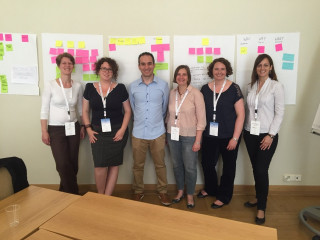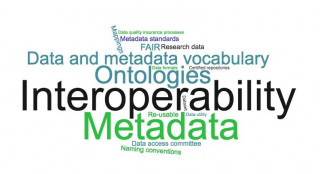Lessons learned reviewing H2020 DMPs
The DCC first ran DMP training courses for European Commission project officers in 2016. We'd been invited in by the Research Executive Agency as reviewing Data Management Plans was new to many and REA staff wanted some guidance on how to assess these deliverables. The courses were very popular, so we added an extended series into the FOSTER open science training project workplan, with Gwen Franck, Eloy Rodrigues and Iryna Kuchma (OpenAIRE/FOSTER) regularly joining myself, Martin Donnelly, Jonathan Rans and Venkat Shanmugasundaram (DCC) on trainings.
The courses covered general Open Science related topics and specific DMP related topics, starting with policy updates from EC staff and then practical advice, tool demos and hands-on exercises reviewing recent plans that had been submitted.
Less is more! A clear, well-written plan that focused on how the research data would be created, documented, licensed and publicly shared is usually achievable in a only a few pages of text.
One of the first reflections Jonathan Rans and I gave when we were training Project Officers was that less is often more. Horizon 2020 DMPs are often much longer than those provided to other funders. Part of this is because it's a deliverable rather than a page-limited part of the application form, and we sensed that is also reflected the process being new to researchers. Many DMPs covered tangential activities that didn't really need to be addressed, such as how publications would be made open access and how APCs should be covered, or with chapters about sharing of presentations and publicity material developed by projects. A clear, well-written plan that focused on how the research data would be created, documented, licensed and publicly shared is usually achievable in only a few pages of text!
Another reflection was that the number of questions and the complexity of terminology used in the H2020 template should be addressed. A survey conducted by OpenAIRE and the FAIR data Expert Group highlighted several terms which researchers found confusing. They indicated the need for support from their libraries and data centres. Using explanatory wording instead of overly technical terms, together with discipline-specific examples could help to address this.
A final observation is that misunderstandings were evident in many of the DMPs we reviewed. There was often a confusion about the difference between sharing within the project versus the public sharing of final versions of datasets in a repository. Projects of spoken about local servers or collaborative tools such as Dropbox as solutions for making data open. The interoperability questions were often poorly addressed, and you can see from the word cloud that these terms were most confusing to researchers.
It is essential for data to have metadata to enable discovery and reuse. A usage licence and identifiers are also key to the "Findability" and "Reusability" of data. We strongly recommend that researchers deposit data of long-term value in formal repositories (particularly those which assign PIDs and usage licences and make make data discoverable via catalogues) as this single action addresses many aspects of FAIR. Repository deposit was the key thing we recommended that EC project officers checked when reviewing DMPs.
The EC has developed an internal checklist to help Project Officers assess DMPs. We used this during the workshop exercise and annotated it to emphasise six primary questions to assess. These would have the greatest impact on the FAIRness of the data and the ability for it to be widely reused, so should - in our view - be more heavily weighted.
Primary questions to address (with the corresponding question numbers):
- Description of data types and formats (question 1.c)
- Unique and persistent identifiers (PIDs) (question 2.1a)
- Rich metadata (question 2.1d)
- Repository deposit (question 2.2c)
- Data and metadata standards for interoperability (question 2.3a)
- Data licensing (question 2.4a)
When you subscribe to the blog, we will send you an e-mail when there are new updates on the site so you wouldn't miss them.

funding from the European
Union's Horizon 2020 Research and
Innovation programme under Grant
Agreement No. 777541.


Comments